"Between the Kingdom and the Desert Sun: Human Rights, Immigration, and Border Walls"
Joint Seminar Series 2015/16 "Diversity and Human Rights" & Special Lecture Series "Borders, Migrants and Refugees"
- Date: Jan 20, 2016
- Time: 02:00 PM - 04:00 PM (Local Time Germany)
- Speaker: Moria Paz (Stanford)
- Moria Paz is a legal scholar focusing on the intersection of minorities, immigrants, international law, and human rights. She is currently working on two books, Network or State? International Law and The History of Jewish Self-Determination (Oxford University Press, forthcoming 2016) and The Law of Strangers – Critical Perspectives on Jewish Lawyering and International Legal Thought (co-edited with James Loeffler) (Cambridge University Press, forthcoming 2016). In 2015, her paper, Between the Kingdom and the Desert Sun: Human Rights, Immigration and Border Walls was selected as one of the best works of recent scholarship relating to immigration law in a review published by Jotwell. In 2014, her paper, the Tower of Babel: Human Rights and the Paradox of Language won the Law & Humanities Interdisciplinary Writing Competition and was selected by European Journal of International Law for its New Voices selection for 2014. In 2013, her paper The Failed Promise of Language Rights, was recognized in the New Voices Panel of the American Association of International Law (ASIL) and was selected for the Junior Faculty Forum for International Law. She also won the Laylin Prize for most outstanding paper in international law awarded by Harvard Law School (2007). Her papers have appeared in multiple journals, including Harvard International Law Journal, European Journal of International Law, and the American Society of International Law. Moria Paz is a Fellow at Stanford Law School. She received her S.J.D. doctoral degree from Harvard Law School. While at Harvard, she was awarded a number of fellowships, including at the Hauser Center for Non-Profit Organizations, The European Law Research Center, and the Weatherhead Center for International Affairs. Before Harvard, she attended The School of Oriental and African Studies at The University of London (England) and Beijing Normal University (China).
- Location: MPI-MMG, Hermann-Föge-Weg 11, Göttingen
- Room: Library Hall

For more details please contact info(at)mmg.mpg.de.
A peculiar construction boom is in progress worldwide: border walls are being installed at an unprecedented rate in order to control unwanted immigration by poor people into wealthy countries. This paper asks why, almost a quarter of a century after the Iron Curtain came down, the walls are now going up again. It provides a provocative answer: I suggest that these separation barriers are a logical response of states to the way in which human rights law has been enforced in cases bearing on immigration. In other words, and counter-intuitively, the recent boom in border wall construction signals the success of the human rights tradition, rather than its failure to establish an alternative to territorial sovereignty. Next, I use the case study of walls to make a larger point on the intractability of the human rights regime that bears on immigration. Building on a systematic analysis of jurisprudence, the paper argues that human rights courts and quasi-judicial bodies utilize an arbitrary category – the presence of the would-be immigrant in the host country’s territory or under its effective control – to balance the policy interests of the individual non-national and the state. The result is essentially random from the perspective of both these stake holders. Walls make concrete a perverse side effect of this compromise: because the regime conflates access with territory, it disproportionately rewards strong young men who already have sufficient capacity (in age, gender, or resources) to scale the barrier, even if their predicament may not actually call for protection. But it privileges them only after they have risked themselves, and if they survive that risk. And so, at least when it comes to immigration, the human rights regime operates in effect as a natural selection mechanism. This is fundamentally unstable and unjust.